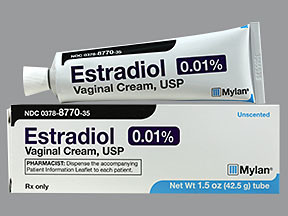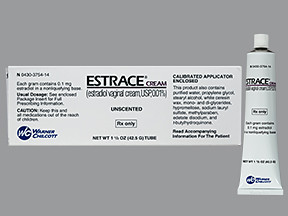ESTROGENS CREAM - VAGINAL
PHONETIC PRONUNCIATION: (ES-troe-jenz)
COMMON BRAND NAME(S): Estrace, Premarin
GENERIC NAME(S): estradiol
Uses
USES: This medication is a female hormone. It is used by women to help reduce vaginal symptoms of menopause (such as vaginal dryness/burning/itching). These symptoms are caused by the body making less estrogen. When treating only vaginal symptoms of menopause, products applied directly inside the vagina (such as this medication) should be used first. Estrogens that are taken by mouth, absorbed through the skin, or injected may have greater risks of side effects due to more estrogen being absorbed.
How to use ESTROGENS CREAM - VAGINAL
HOW TO USE: Read the Patient Information Leaflet if available from your pharmacist before you start using this medication and each time you get a refill. If you have any questions, ask your doctor or pharmacist. Use this medication as directed by your doctor. Fill the applicator with the medication according to the directions. Insert the applicator high into the vagina and press the plunger to release the medication. Clean the applicator with warm soapy water and rinse well. Do not boil or use hot water to clean the applicator. The dosage is based on your medical condition and response to treatment. Use this medication regularly to get the most benefit from it. Follow your dosing schedule carefully. Do not increase your dose or use this medication more often or for a longer time than directed. Tell your doctor if your condition does not improve or if it worsens.
Side Effects
Precautions
Interactions
Overdose
Images
Reviews
Faq for ESTROGENS CREAM - VAGINAL
Estrogen cream is primarily used to relieve symptoms of vaginal dryness, itching, and discomfort that occur due to a decrease in estrogen levels during menopause.
Estrogen cream contains synthetic or natural estrogen, which when applied locally to the vagina, helps to rejuvenate the vaginal tissue by increasing blood flow, improving moisture levels, and restoring elasticity.
To apply estrogen cream, first, wash your hands thoroughly. Use the applicator provided with the cream to measure the prescribed dose, and then insert it into your vagina and release the cream. Follow the instructions provided by your healthcare provider.
Some common side effects of estrogen cream may include vaginal irritation, discharge, or spotting. However, serious side effects are rare but can include an increase in blood clots, uterine cancer, or breast cancer. It is essential to discuss with your doctor and weigh the benefits against the potential risks.
The time it takes for estrogen cream to work can vary from person to person. Some women may experience relief within a few days, while others may take several weeks. It is best to consult with your healthcare provider to determine the expected timeline.
No, estrogen cream is not typically recommended during pregnancy. It is important to consult with your healthcare provider for alternative options or potential risks associated with using estrogen cream during pregnancy.
Estrogen cream is generally not advised while breastfeeding. It is crucial to consult with your healthcare provider who can prescribe alternative options suitable for breastfeeding moms.
Yes, estrogen cream is a prescription medication and is not available over the counter. You will need to consult your healthcare provider to obtain a prescription.
No, estrogen cream is not a contraceptive method and should not be used for birth control purposes. It is advisable to use appropriate birth control methods as prescribed by your doctor.
Warning
WARNING: Estrogens, either used alone or with another hormone (progestin), have rarely caused very serious side effects. Discuss the risks and benefits of hormone treatment with your doctor. Estrogens should not be used to prevent heart disease or dementia. Estrogens can increase the risk of cancer of the uterus (endometrial cancer). Taking a progestin as directed by your doctor can help decrease this risk. Tell your doctor right away if you have any unusual vaginal bleeding. In postmenopausal women, estrogens can increase the risk of cancer of the ovaries, stroke, dementia, and serious blood clots in the legs. Estrogens alone do not appear to increase the risk of breast cancer when used for up to 7 years. Estrogen, when used with a progestin, can increase the risk of heart disease (such as heart attacks), stroke, serious blood clots in the lungs/legs, dementia, and cancer of the breast/ovaries. The risk for serious side effects may depend on the dose of estrogen and the length of time it is used. Therefore, this medication should be used at the lowest effective dose and for the shortest amount of time. Discuss the use of this medication with your doctor and check with him/her regularly (for example, every 3 to 6 months) to see if you still need to use this medication. If you will be using this medication long-term, you should have regular complete physical exams (for example, once a year) as directed by your doctor. See also Notes section.
Disclaimer
IMPORTANT: HOW TO USE THIS INFORMATION: This is a summary and does NOT have all possible information about this product. This information does not assure that this product is safe, effective, or appropriate for you. This information is not individual medical advice and does not substitute for the advice of your health care professional. Always ask your health care professional for complete information about this product and your specific health needs.





No Reviews Yet